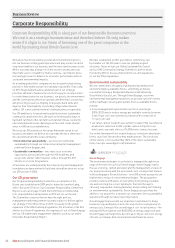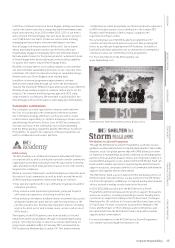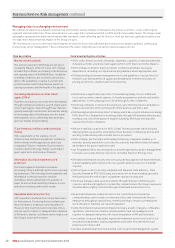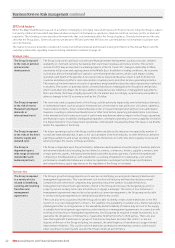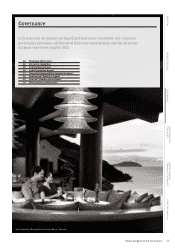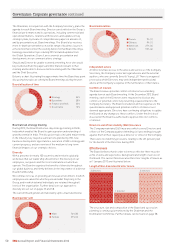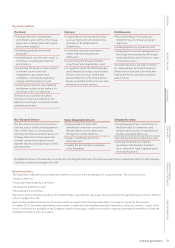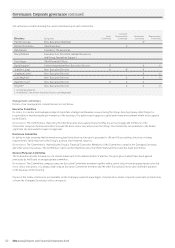Holiday Inn 2012 Annual Report Download - page 46
Download and view the complete annual report
Please find page 46 of the 2012 Holiday Inn annual report below. You can navigate through the pages in the report by either clicking on the pages listed below, or by using the keyword search tool below to find specific information within the annual report.
44 IHG Annual Report and Financial Statements 2012
Operational risks continued
The Group requires the
right people, skills and
capability to manage
growth and change
In order to remain competitive, the Group must employ the right people. This includes hiring and retaining
highly skilled employees with particular expertise or leadership capability. The implementation of the Group’s
strategic business plans could be undermined by failure to build resilient corporate culture, failure to recruit
or retain key personnel, unexpected loss of key senior employees, failures in the Group’s succession planning
and incentive plans, or a failure to invest in the development of key skills.
Some of the markets in which the Group operates are experiencing economic growth and the Group must
compete against other companies inside and outside the hospitality industry for suitably qualified or
experienced employees. Some emerging markets may not have the required local expertise to operate a
hotel and may not be able to attract the right talent. Failure to attract and retain employees may threaten the
success of the Group’s operations in these markets. Additionally, unless skills are supported by a sufficient
infrastructure to enable knowledge and skills to be passed on, the Group risks losing accumulated knowledge
if key employees leave the Group.
The Group is required
to comply with
existing and changing
regulations across
numerous countries,
territories and
jurisdictions
Governmental regulations affect countless aspects of the Group’s business ranging from corporate
governance, health and safety, environmental, bribery and corruption, employment law and diversity,
disability access, relationships, data privacy and information protection, financial, accounting and tax.
Regulatory changes may require significant changes in the way the business operates and may inhibit the
strategy including the markets the Group operates in, brand protection, and use or transmittal of customer
data. If the Group fails to comply with existing or changing regulations, the Group may be subject to fines,
prosecution, loss of licence to operate or reputation damage.
The Group is exposed
to the risk of litigation
Certain companies in the Group are the subject of various claims and proceedings. The ultimate outcome of
these matters is subject to many uncertainties, including future events and uncertainties inherent in litigation.
In addition, the Group could be at risk of litigation from many parties, including but not limited to, guests,
customers, joint venture partners, suppliers, employees, regulatory authorities, franchisees and/or the owners
of hotels it manages. Claims filed in the US may include requests for punitive damages as well as compensatory
damages. Unfavourable outcomes of claims or proceedings could have a material impact on the Group’s results
of operations, cash flow and/or financial position. Exposure to significant litigation or fines may also affect the
reputation of the Group and its brands.
The Group is exposed
to risks related to
corporate
responsibility
The reputation of the Group and the value of its brands are influenced by a wide variety of factors, including
the perception of stakeholder groups such as the communities in which the Group operates. The social and
environmental impacts of business are under increasing scrutiny, and the Group is exposed to the risk of
damage to its reputation if it fails to demonstrate sufficiently responsible practices, ethical behaviour, or fails
to comply with relevant regulatory requirements.
The Group is exposed
to a variety of risks
associated with its
financial stability and
ability to borrow and
satisfy debt covenants
While the strategy of the Group is to extend the hotel network through activities that do not involve significant
amounts of its own capital, the Group does require capital to fund some development opportunities and to
maintain and improve owned hotels. The Group is reliant upon having financial strength and access to
borrowing facilities to meet these expected capital requirements. The majority of the Group’s borrowing
facilities are only available if the financial covenants in the facilities are complied with. Non-compliance with
covenants could result in the lenders demanding repayment of the funds advanced. If the Group’s financial
performance does not meet market expectations, it may not be able to refinance existing facilities on terms
considered favourable.
The Group is exposed
to funding risks in
relation to the defined
benefits under its
pension plans
The Group is required by law to maintain a minimum funding level in relation to its ongoing obligation to provide
current and future pensions for members of its UK pension plans who are entitled to defined benefits. The
contributions payable by the Group must be set with a view to making prudent provision for the benefits accruing
under the plans of the Group.
In particular, the trustees of IHG’s UK defined benefit plan may demand increases to the contribution rates
relating to the funding of this plan, which would oblige relevant employers of the Group to contribute extra
amounts. The trustees must consult the plan’s actuary and principal employer before exercising this power.
In practice, contribution rates are agreed between the Group and the trustees on actuarial advice, and are
set for three-year terms. The funding implications of the last actuarial review are disclosed in the notes
to the Group Financial Statements on pages 118 to 121.
The Group may face
difficulties insuring
its business
Historically, the Group has maintained insurance at levels determined to be appropriate in light of the cost
of cover and the risk profiles of the business in which it operates. However, forces beyond the Group’s control,
including market forces, may limit the scope of coverage the Group can obtain and the Group’s ability to
obtain coverage at reasonable rates. Other forces beyond the Group’s control, such as terrorist attacks or
natural disasters may be uninsurable or simply too expensive to insure. Inadequate or insufficient insurance
could expose the Group to large claims or could result in the loss of capital invested in properties, as well
as the anticipated future revenue from properties, and could leave the Group responsible for guarantees,
debt or other financial obligations related to such properties.
Business Review: Risk management continued


